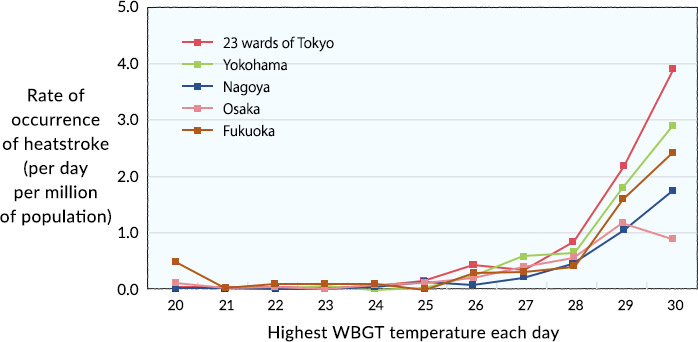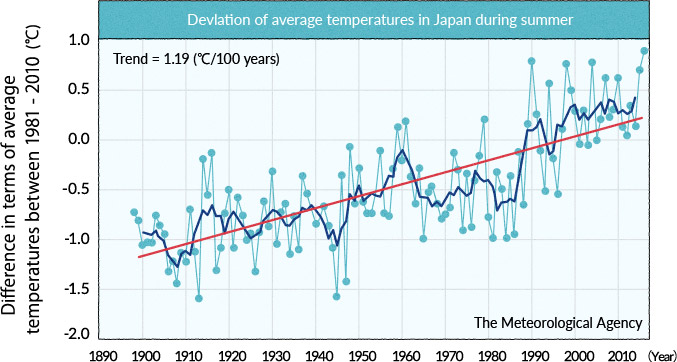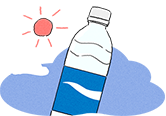How to use the WBGT heat index
Body temperature increases not only when the temperature is high, but also when there is high humidity, which makes it difficult for sweat to evaporate. Also, the temperature felt by the body is affected by direct or reflected sunlight. The Wet Bulb Globe Temperature (WBGT) is an index of heat that comprehensively takes into account the factors of heat that cause heat disorders: temperature, humidity, solar radiation, and airflow.
Since it is easy to develop heat disorders when the WBGT is high, this index is used to prevent heat disorders at work sites, during sporting activities, and in everyday life.

According to the data on persons transported via emergency transport services in 2005 in major metropolitan areas, there is a correlation between the daily maximum WBGT temperature and the incidence of heat disorders.

The wet bulb temperature indicates humidity, the black globe temperature indicates radiant temperature, and the dry-bulb temperature indicates air temperature. The WBGT combines all of these.
Outdoors: WBGT = 0.7 × wet bulb temperature + 0.2 × black globe temperature
+ 0.1 × dry-bulb temperature
Indoors: WBGT = 0.7 × wet bulb temperature + 0.3 × black globe temperature
Reference: Ministry of Health, Labour and Welfare. "Using the WBGT Index to Prevent Heat Disorders."
Guidelines use in for everyday life
| Air temperature (typical value) |
Temperature and level of risk (WBGT) | Activity Guidelines | Notes |
|---|---|---|---|
| ≥ 35℃ | Hazardous (≥ 31℃) |
Hazardous doing any kinds of daily activities | Risk is severe especially for the elderly under any circumstances. Avoid going outside and stay in a cool room |
| 31 - 35℃ | Severe (28 - 31℃*) |
Severe risk in any kinds of daily activities | Avoid direct sunlight when going out. Be conscious about the room temperature inside. |
| 28 - 31℃ | High (25 - 28℃*) |
High risk in some daily activities | When exercising or being active, make sure to rest regularly. |
| < 28℃ | Moderate (< 25℃) |
High risk in some active daily activities | The risk is low but there is a risk during heavy exercise or heavy work. |
- *(28 to 31℃) and (25 to 28℃) respectively indicates 28℃ to less than 31℃ and 25℃ to less than 28℃.
Japan Society of Biometeorology “Guidelines for prevention of heat disorders in everyday life” 2013
Guidelines for exercise
| Air temperature (typical value) |
WBGT | Guide to how much exercise can be safely performed |
|---|---|---|
| ≥ 35℃ | ≥ 31℃ | If above WBGT 31℃, all exercise should be stopped except for special cases. Children in particular should stop exercises. |
| 31 - 35℃ | 28 - 31℃ | Above WBGT 28℃ the danger of heat disorders is high, so events that require heavy exercise or events where the body temperature will rise, such as endurance races, should be avoided. When such events are held, rest periods should be provided often and adequate water replenishment enforced. People who are weak or not used to the heat should stop exercising. |
| 28 - 31℃ | 25 - 28℃ | Above WBGT 25℃ the danger of heatstroke increases, so rest periods should be provided often and water replenishment conducted. Rest periods should be provided every 30 minutes for events requiring heavy exercise. |
| 24 - 28℃ | 21 - 25℃ | Above WBGT 21℃ there is the danger of fatal accidents due to heatstroke, so caution is advised, and water replenishment should be actively encouraged during exercise. |
| < 24℃ | < 21℃ | Below WBGT 21℃, normally the danger of heatstroke is small, but appropriate water replenishment is necessary. Heatstroke can occur even under these conditions in events such as citizen marathons, so caution is advised. |
Source: Japan Sports Association, "A Guidebook for the Prevention of Heat Disorder During Sports Activities" 2013






